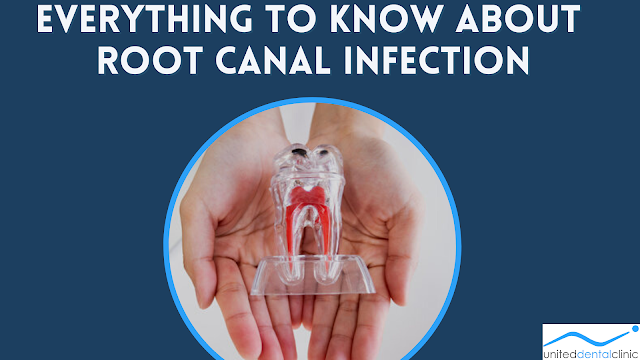Everything To Know About Root Canal Infection
Dental root canals are a common dental infection.
Should you be concerned about root canal infection? Can a root canal infection be completely cured with root canal treatment? Does the treatment have any potential side effects?
This article will answer your questions regarding root canal infection and treatment. So, let's get started without wasting a moment.
What is a root canal infection?
The enamel, the outermost and hardest layer of our teeth, is followed by the dentin, the next softer and more porous layer, and the pulp, which is the deepest layer.
The pulp is a group of tissues and blood vessels that feed and maintain the health of your tooth.
A root canal infection will develop when your teeth decay or suffer trauma. This injury enables harmful germs to penetrate your tooth's roots and reach the pulp.
The germs will spread to other oral regions after the pulp infection. Moreover, the germs spread quickly once they infect the pulp and can cause abscesses, gum infections, and pain throughout the jaw.
So, getting an evaluation and, if required, having a root canal treatment to preserve your tooth from extraction is best.
However, if you have passed all the stages of infection and your teeth are beyond repair, worry not. You can get veneers procedure and make your smile anew.
What are the main causes of root canal infections?
The tooth's shape: Narrow or curved teeth can often complicate root canal shapes. So, diseased regions would go undiscovered during treatment.
Accessory Canals: Your tooth may have some additional canals that might harbour germs and lead to reinfection of the treated tooth.
Delay in capping a tooth: If a permanent filling or crown is not placed right after a root canal treatment, or if the filling develops a crack or break, germs will enter the canal and infect it.
Cavities: A new cavity may form immediately following, leading to reinfection.
Beware of the following warning signs of root canal infection
1. Tooth pain
2. Dark Tooth
3. Dental abscess
Also read: All-on-4 Dental Implants Treatment: Everything To Get Effective Results!
How does root canal treatment helps ward off root canal infection?
The following three phases make up root canal treatment.
1. Root canal cleaning
2. Root canal filling
The dentist cleans, disinfects, and shapes the space. The tooth is then filled with a rubber-like substance, and the root canals are sealed with adhesive cement.
After the root canal treatment, the tooth becomes dead because of the removal of nerve tissues along with infection. As a result, the patient will no longer feel pain in that area.
3. Adding a crown
Conclusion
Our body typically fights infections quite well. However, the body cannot produce antibodies for the tooth. The odds of the tooth's nerves dying increase if the root canal becomes infected.
Nevertheless,root canal treatment can successfully save an infected or damaged tooth. Moreover, anaesthesia and new technology help make root canal procedures as comfortable as possible.




Comments
Post a Comment